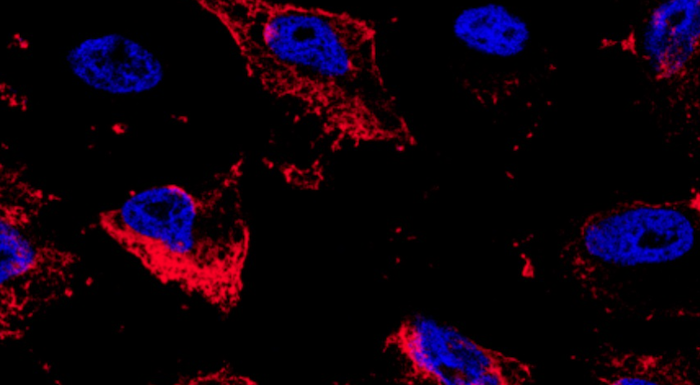A CSIC researcher leads ‘Nano4Zombie’, which aims to eliminate ‘old’ tumour cells using magnetic nanoparticles
María Moros, a researcher at the Consejo Superior de Investigaciones Científicas (CSIC) at the Instituto de Nanociencia y Materiales de Aragón (INMA), a joint institute of the CSIC and the University of Zaragoza, is leading the ‘Nano4zombie’ project, which aims to develop an innovative therapeutic approach for the elimination of senescent tumour cells using a multifunctional nanoplatform based on magnetic nanoparticles (MNP). The work is now starting with an endowment of 1,086,000 euros for the entire consortium, which includes four partners from three countries, and a duration of three years.
Throughout life, ultraviolet radiation or treatments such as radiotherapy and chemotherapy can cause cells to age prematurely, causing them to stop dividing but not die, known as premature cell senescence. These cells become “zombie” cells that stop “functioning properly”. Over time, large numbers of aged or senescent cells accumulate in the body’s tissues. Resistant to cell death, they may contribute to tissue ageing or promote tumour recurrence, metastasis or drug resistance. Therefore, elimination of senescent cancer cells represents a novel and promising anti-cancer strategy.
Several drugs capable of selectively killing senescent cancer cells have been identified and tested, but their effectiveness may be limited by their low bioavailability and side effects. The Nano4Zombie project proposes an innovative therapeutic approach for the elimination of senescent tumour cells using a multifunctional nanoplatform based on magnetic nanoparticles (MNP). These will be decorated with a novel combination of therapeutic agents and specific antibodies that target zombie cells more precisely. In addition, the MNPs will be used to produce stress in the cell to enhance the effect of the drugs. To validate the strategy, skin cancer (melanoma and non-melanoma) has been selected as a model, due to its high incidence in the Caucasian population.
Nano4Zombie is a multidisciplinary project that will merge the knowledge of a research team involving scientists from four research centres in Spain, Poland and Latvia specialised in materials science, medicine, biogerontology, chemistry and pharmacy. The results obtained may have an impact in the field of oncology, but also in other fields such as tissue ageing. In addition to María Moros’ team, which coordinates Nano4Zombie, the project has the following European partners: Anna Lewinska (University of Rzeszów, Poland), Grzegorz Litwinienko (University of Warsaw, Poland) and Aija Aine (Centre for Biomedical Research and Studies, Latvia).
This news is part of the action PCI2023-143448 funded by MCIN/AEI/10.13039/501100011033 and co-funded by the European Union, being PCI2023-143448 the reference in the award resolution; MCIN the acronym of the Ministry of Science and Innovation; AEI the acronym of the State Research Agency; 10.13039/501100011033 the DOI (Digital Object Identifier) of the Agency”. Nano4Zombie was one of the projects selected in the Joint Call 2022 of the M-ERA.NET 3 initiative, an international network co-funded by the European Union through its Framework Programme for Research and Development (Horizon 2020, GA 958174) to support European research programmes in materials science and engineering. The project is funded by AEI (Spain), NCN (Poland) and LZP (Latvia).
02-11-2023









